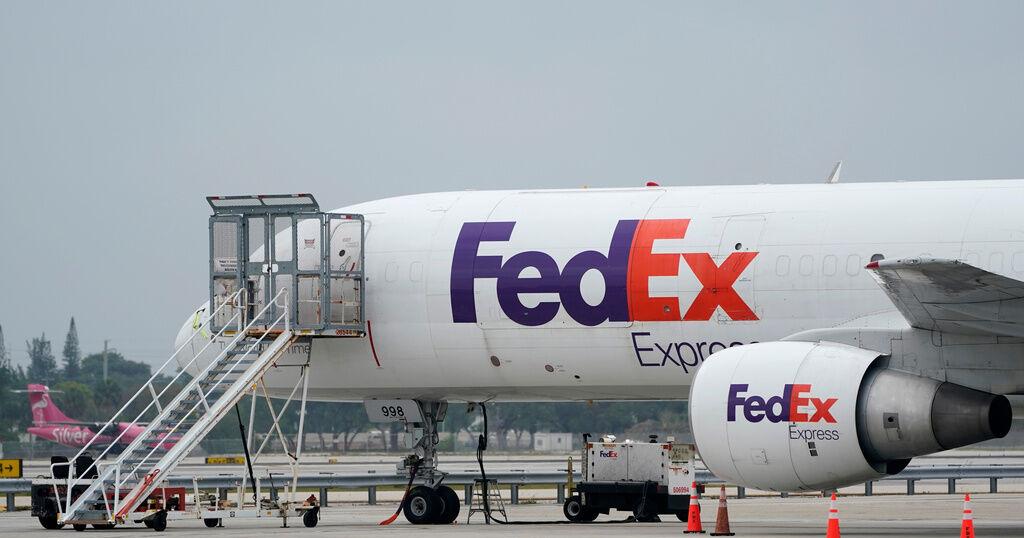**U.S. Flight Capacity Cuts and Cargo Plane Groundings Could Squeeze Holiday Shipping**
**NEW YORK** — The Federal Aviation Administration’s (FAA) recent announcement of a 10% reduction in flight capacity across 40 major U.S. airports may strain air cargo operations just as the critical holiday season approaches.
Key airports with major package distribution centers are among those impacted. FedEx has hubs in Indianapolis and Memphis, while UPS’s biggest hub, Worldport, is in Louisville, Kentucky—site of this week’s deadly cargo plane crash.
Meanwhile, both UPS and FedEx announced late Friday they’re grounding their fleets of McDonnell Douglas MD-11 airplanes “out of an abundance of caution” after Tuesday’s crash, which killed 14 people, including the three pilots on the MD-11 en route to Honolulu. MD-11 aircraft represent about 9% of the UPS fleet and 4% of FedEx’s, the companies said.
—
### Potential Impacts on Holiday Shipping
For now, logistics companies say consumers should not expect package delays due to the flight reduction. However, both the FAA cut and the grounding of the MD-11s put additional strain on the supply chain just ahead of peak shopping season.
Patrick Penfield, a supply-chain management professor at Syracuse University, called the 10% capacity reduction and the grounding a “one-two punch” for cargo carriers and shoppers alike.
> “This is such a stressful time for both companies, and you’ve got this surge in demand and then you just lost some of your capacity,” Penfield explained. “So they’re already scrambling as it is during the holiday season, and they’re going to scramble even more.”
He estimates it could take weeks before UPS and FedEx return their MD-11 fleets to service after a thorough safety review. In the busiest weeks of mid-December, shoppers could see delivery delays of a day or two. He recommends ordering holiday gifts early this year.
—
### How Will the FAA Reductions Affect Air Freight?
The 10% reduction in flight capacity is focused on domestic flights at 40 airports, in effect for daily scheduled operations between 6 a.m. and 10 p.m. local time. Notably, the FAA’s order does not explicitly address cargo flights, but it does limit total flights, impacting both passenger and freight services.
Most air freight by value is international. The cutbacks currently affect only domestic travel, leaving international air freight largely untouched for now. According to the International Air Transport Association, airlines transport about 35% of global trade by value, but only about 1% by volume.
Air freight moves not only on dedicated cargo planes but also in the bellies of passenger jets. Both FedEx and UPS note that many of their flights operate at night, outside the restricted window, and both companies say they have contingency plans to protect shipments of critical items, such as pharmaceuticals and medical devices.
> FedEx reported, “We’ve made the necessary operational modifications to meet the requirements so that shipments continue to move safely and swiftly through our network.”
> UPS shared, “We have built our network to be safe and resilient, and we’re confident we can keep delivering the reliable service our customers count on.”
—
### How Logistics Companies Are Adapting
Western Global Airlines is the only other U.S. cargo carrier operating MD-11s, with 16 in its fleet—though 12 are currently in storage.
Mike Short, president of Global Forwarding at freight forwarder C.H. Robinson, said they’re working with customers on contingency plans for the flight reductions, if needed.
> “While the FAA’s 10% reduction in intra-U.S. flights will create some ripple effects in transportation, the impact on air freight overall is expected to be limited,” he noted.
Because most domestic air freight moves in the bellies of passenger aircraft, reductions in commercial routes will tighten air capacity. Short-term, this could mean temporary constraints and longer transit times for some routes.
Trucks and expedited ground networks can absorb some displaced volume, but this comes with challenges, including higher spot rates and equipment repositioning. Smaller, high-value goods—such as smartphones, microchips, video game consoles, and electronic toys—are more likely to be shipped by air.
Domestic overnight parcels and letters, often carried by air, could also shift to trucks if needed, reducing the risk of significant delays. Ed Anderson, professor at the University of Texas’s McCombs School of Business, noted trucks may pick up this slack, mitigating the potential impact on consumers.
—
### Ongoing Disruptions and Industry Outlook
Brandon Fried, executive director of the Airforwarders Association, said the situation is worsening an already disrupted aviation sector.
> “Air cargo depends on every part of the aviation ecosystem working in sync. When capacity is cut and federal employees are stretched thin, the supply chain slows, and the longer this shutdown continues, the worse it will get,” he said.
Eytan Buchman, chief marketing officer for cargo booking platform Freightos, added that fewer flights will tighten the domestic cargo-moving ecosystem.
> “Typical safety valves will tighten and that may lengthen lead times and lift spot prices. The silver lining is that airlines have become very good at consolidating loads and adjusting fleets after five years of dramatic supply chain swings, so this won’t translate to a simple one-to-one loss of capacity everywhere,” he explained. “Expect carriers to prioritize high-yield lanes, route via secondary hubs, and shift some domestic legs to other modes where feasible.”
In the near term, space may feel tighter and schedules less predictable on some U.S. routes. However, the industry’s adaptability could soften the blow, and logistics experts recommend planning ahead to avoid possible holiday delivery delays.
—
**Bottom Line:** As both capacity cuts and aircraft groundings ripple through the sector, the air cargo industry faces a holiday season under pressure. Logistics companies remain optimistic about minimizing disruptions, but consumers hoping for on-time holiday deliveries should consider ordering early this year.
https://www.phillytrib.com/news/business/flight-cuts-from-government-shutdown-strain-a-supply-chain-thats-already-stretched-thin/article_2bc1514f-20a4-4ddb-8c5e-0714320a4fda.html

